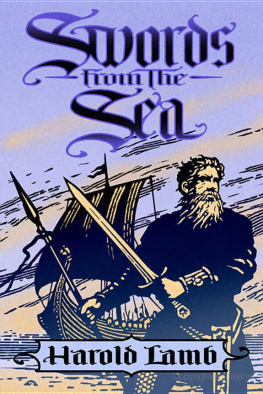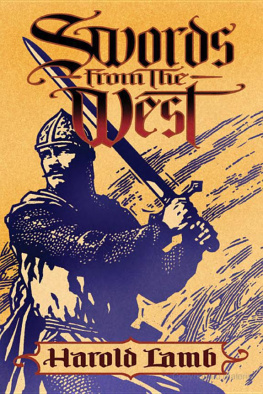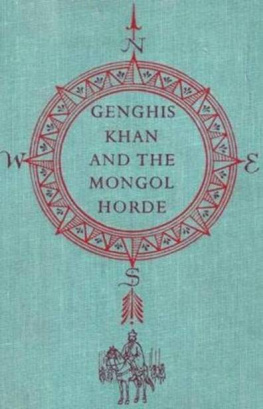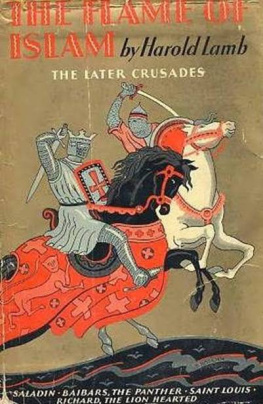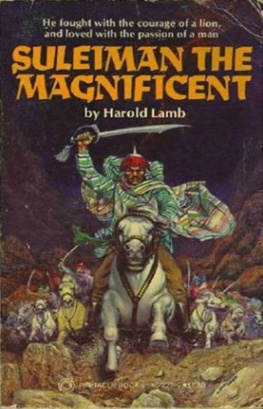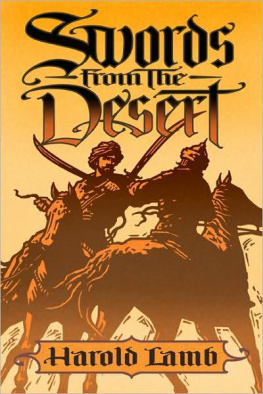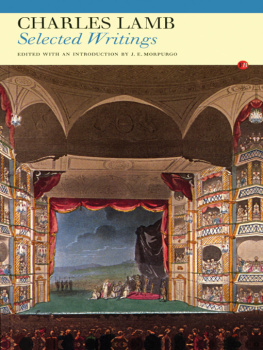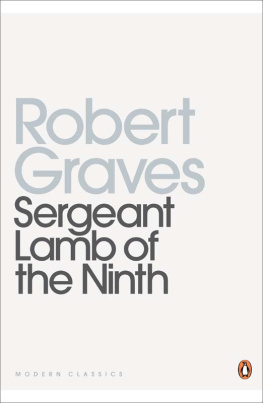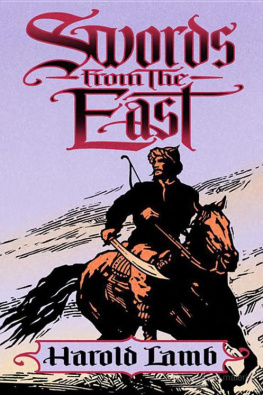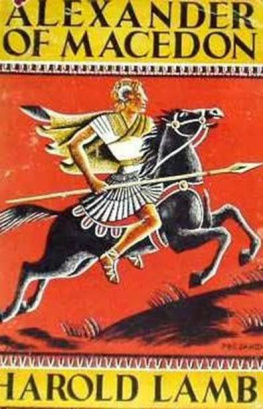






vii
xi
xiii
i 15 27166543

This volume of Harold Lamb stories collects his historical magazine tales of seafarers, wanderers, marines, and Vikings. There are even some Cossacks here because there wasn't room for them in the final volume of Lamb's Cossack collections. Truth be told, they would have been an odd fit, as the Cossacks themselves are secondary characters to John Paul Jones, commander of Catherine the Great's navy, and the political double-dealing that proves more treacherous to Jones than the enemies on the water in two short novels of naval action upon the Crimean.
Here too is the exciting tale of a doomed search for the northeast passage by an English expedition, challenged by both the elements and a traitor in their ranks, and Lamb's last long historical, a compelling novel of the American expedition against the Barbary pirates. "The Drub-Devil March" shows that Lamb could well have kept spinning historical yarns of the quality from his Adventure days, if he'd had the time or inclination.
I became a Lamb fan by stages. I enjoyed his Hannibal biography so much in high school that I sought out more by him, hoping that The Curved Saber would contain more tales of the great Carthaginian J didn't have a clue then that sabers weren't remotely Carthaginian. It proved instead to be a collection of Khlit the Cossack stories, which I read and loved. I didn't discover for many more years that there was a sequel volume, or that White Falcon featured many of the same characters, or, later still, that there were dozens of other Harold Lamb historicals that had never been collected. I was naive enough to assume that if a story hadn't been collected it must not be as good, a notion quickly dispelled when I purchased Dr. John Drury Clark's Harold Lamb Adventure collection from his widow. These stories were just as good-and some of them were better-than those already between book covers.
I enjoyed myself so thoroughly with those Lamb tales that I went looking for more. The earlier fiction from the more obscure pulps proved disappointing, as I've discussed elsewhere. But the first tale I read in Collier's impressed me mightily, a 5,ooo-word adventure of a Cossack, an allegedly haunted tower, a lovely princess, and a scheming noble ... all in all, pretty grand stuff. I thought I'd found another treasure trove until I read the next Collier's story, which was a pretty similar tale with different stage dressing. So too was the next, and the next, and the next ...
Maybe that's how the Collier's editors wanted things. Perhaps they didn't think their readers would care for historical adventure unless it was a romance. Maybe Lamb's own outlook had changed and he wanted to write stories with dependably happy endings. Collier's, Pictorial Review, and the Saturday Evening Post published him regularly, and all of his work began to read the same. Not everything was formula, though-from this period came "Lionheart" and "Protection," both found in Swords from the West (Bison Books, 2009, powerful pieces with romance as a driving theme but simply head and shoulders above the others, and one of my very favorite Lamb shorts, the moving "Devil's Song," found in Swords of the Steppes Bison Books, 2007). On reading these it becomes clear that Lamb could still surprise with those characteristic twists and turns, and I can't help wondering if the change in tone was the fault of editors who were saying, "We'll take these, but try not to be so bleak next time-can you give us more happy endings?" How else then to explain away forgettable fare like "The Lady and the Pirate" and several others included here only in the interest of completeness?
Every good critic knows that you should judge a body of work by its most outstanding successes first. Lamb had many more successes than most writers, and it must be said that when viewed singly, most of these later stories are fine writing. Even if the endings are reminiscent of each other, the path to that conclusion varies. It must be remembered, too, that they originally appeared in magazines over a span of years; they were never intended to be read one after the other. Like Lord Dunsany's tales of Jorkens or Seabury Quinn's Jules de Grandin stories, they are better when they're not read back to back.
Aside from the aforementioned, my favorites from this period are Lamb's seven Viking yarns. Lamb always presents the Viking mind-set ably and gets a lot of play out of the honorable barbarian facing off against civilized schemers. His Vikings may be uneducated in the ways of civilization, but they're no fools, and they're stout warriors with flashes of grim humor.
Lamb's ability to slide into the viewpoint of other cultures seems almost effortless. Having been schooled in rationality ourselves, we sometimes forget how cultures in other times viewed the workings of the world around them. Thus, in "Elf Woman" the Icelander Rang believes without question that there is a god slumbering in his volcano, and in "Forward!" the Cossack Ivak realizes, not with surprise but with understanding, why the men he chances upon react in astonishment to his reappearance, for they had assumed him dead. Their natural conclusion isn't that he has survived his wounds and come galloping after them:
By their bearing they were outlaws of the band, and their jaws dropped when they saw my face. Afterward Iremembered that they must have thought me dead, and when the big black rushed on them in the eye of the rising sun they believed a bloody specter had come up out of Father Dnieper to settle their hash.
Magic and the supernatural are woven throughout the belief systems of these cultures; through the eyes of Lamb's characters, commonplace events can take on supernatural significance-the sight, for instance, in "Wolf Meat," of a man on skis who seems to his observer to be flying across the face of the snow. Showing us magical thinking in this way is a technique Lamb used sparingly but well throughout his historicals, and it is a technique seldom applied by other writers.
This collection concludes with Lamb's first printed story for the magazine that published his very best historical fiction, Adventure. "His Excellency the Vulture" might be simpler work than some of the other material included here, but it was a leap forward for Lamb, and contains what would soon become his trademarks: clever plotting, driving action, and wily lead characters. The appendix contains an added treat. In addition to the usual letters is an essay by Adventure editor Arthur Sullivan Hoffman that provides a fascinating behind-the-scenes look at Lamb's drafting practices and the challenges he faced in writing and publishing.
For those in search of other Lamb stories, I hope it hardly needs to be pointed out that there are eight Bison Books collections brimming with Harold Lamb's work, and three novels of Sir Hugh and the sword of Roland ~Durandal, The Sea of Ravens, and Rusudan) from Donald M. Grant. But if you're still wanting more Harold Lamb adventure stories, Omar Khayyam and Nur-Mahal are historical novels even though they're of ten located in the biography section of your local library. There may yet be some stirring historical work in other pulp magazines from Lamb's early days; Jan Van Heinegen and other fans still search diligently. And lest we forget, there is a whole shelf full of histories and biographies that brought Lamb fame and recognition.
Next page
